Rocketman takes most of the big creative swings that Bohemian Rhapsody didn't, and while its tale of childhood trauma, meteoric success followed by an inevitable fall and return is chock full of rock star biopic cliches there's at least an attempt to do something different with the genre. The trailers called this a musical fantasy, and they didn't lie. Iconic Elton John songs like "Tiny Dancer," "Goodbye Yellow Brick Road," and "Bennie and the Jets" provide the backdrop for fantastical sequences filled with dream imagery, tightly choreographed dancing, and even a man-on-man sex scene, the first of its kind for a major studio release. Not everything works, but you can never accuse Rocketman of not taking some impressive chances.
Then - spoiler - at the very end they just splice Taron Egerton into one of Elton's old music videos.
WTF?
Let's back up.
Rocketman and its gloriously over-the-top flare is pretty much what you'd expect from anything personally curated by Elton John, the shy, chubby kid from Middlesex who looked at Liberace and said, "Yes, all of that, but bigger, better, and louder!" Produced by John and his husband David Furnish and written by Billy Elliot's Lee Hall, Rocketman had a particularly long development period, passing from Moulin Rouge's Baz Lurhmann to The Greatest Showman' s Michael Gracey before landing with Dexter Fletcher.
An actor turned director, Fletcher made sense for Rocketman on several levels: thanks to Eddie the Eagle he already knew Egerton, John's handpicked choice to play him; thanks to his emergency pinch hitting for Bryan Singer on Bohemian Rhapsody he definitely knew what not to do in the genre; and thanks to Sunshine on Leith, his Proclaimers musical, he already knew how to merge biography with old movie musical theatricality.
His pitch for Rocketman: lean into the most obvious visual metaphors possible. The critics will kill you for it, but it's what the audiences will remember the most about the movie.
For example, those lucky enough to be in attendance at John's 1970 Troubadour show - his first ever US appearance - always describe feeling as if his music and obvious stardom could literally lift them off the ground. So, fuck it, when you do that scene in the movie have everyone in the crowd and on stage literally levitate in air mid-song. Who cares if the song you pick for the scene, "Crocodile Rock," wasn't even written and recorded until 1972 meaning it couldn't have even been played at that point in John's life? All anyone is going to remember is the part with everyone floating in the air.
Similarly, who cares if "Rocket Man" was actually written by Bernie Taupin (played in the film by Jamie Bell) as a kind of "Space Oddity" knock-off/Ray Bradbury homage? No, when you do it in the movie you make it about John's spiraling drug addiction and depression.
People have always interpreted the line "And I'm gonna be high as a kite by then" as an obvious drug allusion. So, just run with that and make it about John's drug-influenced suicide attempt and subsequent 1975 Dodgers Stadium performance, where his raucous on-stage performance belied the emptiness in his soul at that very moment. Like the song's protagonist, he wasn't really the man everyone thought he was, and the rocket ship of fame and super stardom had left him "burning out his fuse up here alone."
But people buying a ticket to Rocketman aren't looking for subtlety or somber introspection. You've got to make your point flamboyantly. So, why not go full-on Moulin Rouge with the theatricality and have Elton literally turn into a rocket man who shoots off into space while singing the song's chorus?
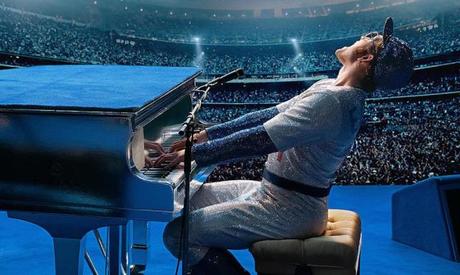
These are but two of the higher profile examples throughout the movie, but they are each indicative of Rocketman's general approach to musical biopic storytelling. You've got to always be willing to go just a bit further with the visuals. Fletcher doesn't always stick to it. "Don't Go Breaking My Heart," for example, is recreated from the old music video.
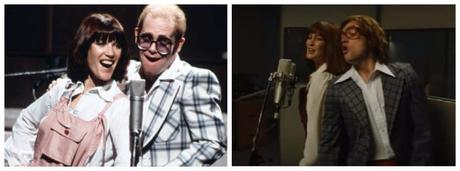
But then again, "Benny and the Jets" is used as the soundtrack to an orgy of pulsating, sweaty bodies practically lifted straight out of Gasper Noe's Climax. So, if there's a dial Rocketman usually pushes it to 11.
Who knows? Maybe Rocketman will someday become a Broadway musical, a not-small-possibility given John's long history with the Great White Way. Why not give those hypothetical future directors some musical numbers which will knock the socks off of every tourist expecting a by-the-numbers jukebox musical?
If so, the future custodians of Rocketman must do something about that ending because after two hours of flashing jazz hands and hilariously, but memorably obvious visual metaphors the film simply limps off the screen with a CGI magic trick which hasn't looked impressive since the days of Forrest Gump.
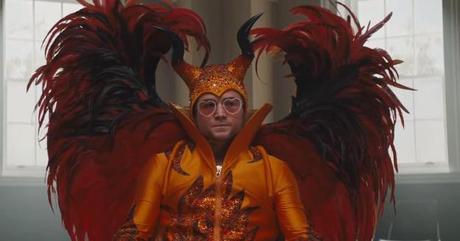
To set the stage: Lee Hall's script frames the entire story around John voluntarily entering rehab in 1990. He walks away - in full costume - from a sold-out series of Madison Square Garden performances and marches right into an AA meeting to tell a group of strangers his entire life story. Plucked from the pages of the diary John kept during his rehab stint, Hall lays out a series of flashbacks which basically boil down to psychology 101: always blame the parents.
Born to an emotionally distant and usually physically absent father and a sometimes supportive, but oftentimes emotional kamikaze of a mother (played to bewildering effect by Bryce Dallas Howard), John spent much of his life seeking out the love he was denied as a child. Sadly, he usually went looking in the wrong places. Manipulated and abused by his first lover/manager (an evil with a capital E Richard Madden), too often abandoned by his best friend Bernie Taupin (who is shown to notice John's troubles but never do as much as he could to help), and gobbled up and spit out by the celebrity machine, John sought meaning in sex, drugs, and rock n' roll.
None of it, not to go all Marie Kondo on you, sparked joy. At least not enough joy. Before long, he needed the next high.
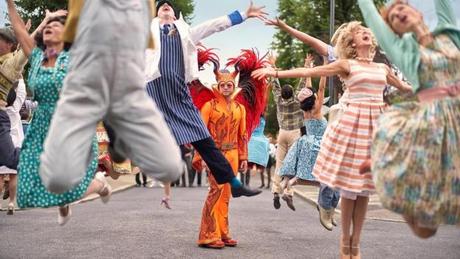
The film is thus the story of Elton's rocky path toward eventually learning to truly love himself and love/forgive his family friends while going clean in rehab in 1990. In one climactic scene, Howard, Madden, Bell, and others suddenly join the AA meeting, by which point John has shed his stage costume and is wearing just a bathrobe, stripping himself bare in more ways than one. The old friends appear as ghostly apparitions to quarrel with John about how much blame they do or do not deserve for all the troubles in his life. In that moment, John makes peace with every one of them, excising them to an extent. It's the natural end to the film's emotional journey.
But that's not how you end an Elton John movie musical. No, you've got to close out with a big musical number, Bollywood style. It's what the audience wants. It's what The Greatest Showman, Bohemian Rhapsody and Aladdin each already gave them in the past 2 years. So, what's your CGI Live Aid moment, Rocketman?
Um, it's this:
It's, quite simply, the music video for Elton's 1983 hit "I'm Still Standing" with Egerton CGIed over Elton's body and some slight recreations on the edges. The song choice is apt. Rocketman is a survivor's story, and "I'm Still Standing" is the perfect, catchy, and anthemic explanation point at the end of that sentence. However, a kitschy, deceptively transgressive old 80s music video with a straw-hat-wearing Elton gallivanting on the beachy shores of Cannes and Nice is hardly the best visual metaphor for that message.
In fairness, perhaps the problem is with me. Maybe I'm only annoyed by this ending because I already know the music video. However, even if I didn't I think I'd at least notice how Rocketman goes from looking like a 2019 movie with sumptuous cinematography for two hours and then closes out with three minutes of subgrade old film which has been digitized but not entirely upgraded?
But earlier I said Bohemian Rhapsody should have taught Dexter Fletcher what not to do. Implicit in that statement was an assumption that Bohemian Rhapsody did anything wrong. Fletcher clearly thinks it's fine to close out two straight musical biopics with CGI recreations of something anyone could have already watched for free on YouTube - Live Aid for Bohemian, "I'm Still Standing" for Rocketman. Bohemian' s amazing box office indicates he was right the first time. Maybe he'll prove to be right this time as well.
Still, it's a truly odd choice. It lacks the imagination on such rich display throughout the just about all of Rocketman. Admittedly, I'm still humming "I'm Still Standing" a week after seeing the movie, because it's a good song. Months from how, however, I won't remember this ending.
Instead, I'll remember the "Rocket Man" and "Crocodile Rock" scenes, and even the "Tiny Dancer" scene, which though much, much smaller - just Elton singing quite mournfully as he watches the LA Ladies seducing Bernie Taupin right out of his life - it illuminated something new about the song for me. Not so much with "I'm Still Standing." I didn't need a big budget movie musical to just give me the music video again.
What about you? Let me know in the comments.
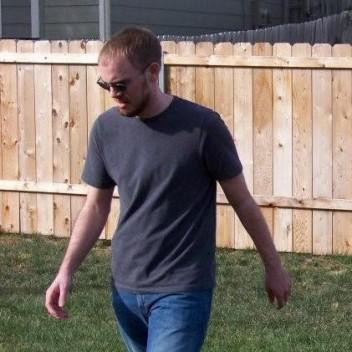
Grew up obsessing over movies and TV shows. Worked in a video store. Minored in film at college because my college didn't offer a film major. Worked in academia for a while. Have been freelance writing and running this blog since 2013. View all posts by Kelly Konda

